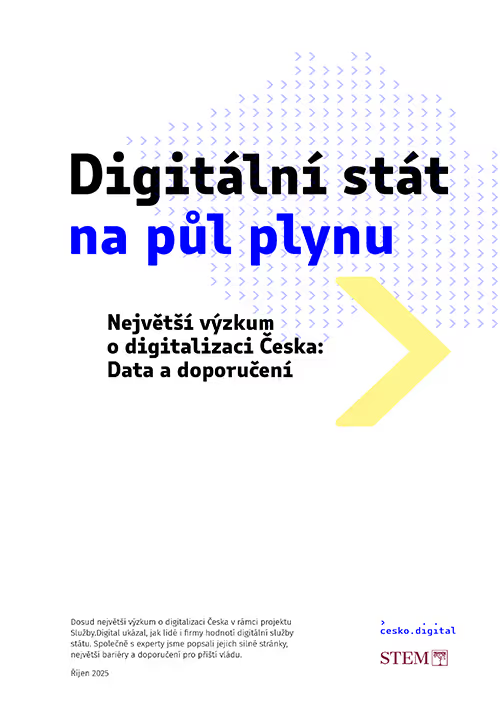Together for cutting-edge digital government services
for this project is STEM.

Czech Republic as a European leader in digitisation?
The data speaks clearly. We've got it!
Demand is huge - the vast majority of people and businesses want digital government services that save time and money, are accessible, secure and user-friendly.
We know how to do it - we have specific recommendations for the government. But to overcome the current barriers to digitalisation, we need above all courage and collaboration across government, business and citizens.
wants to be able to deal with official business online
are satisfied with the current state of digitalisation
has lost a significant amount of time due to problems with the state's current digital services
this is how most companies in the Czech Republic would mark the digitalization of public administration
Services.Digital
For cutting-edge digital government services
- We bring data and expertise to
We offer insights to help make better decisions. - We connect people and ideas
We build bridges between authorities, companies and citizens. - Helping to push for change
We support those who have the courage to move things forward.
The largest research on the digitisation of the state
We know theneeds of citizens, companies and the state

Public, business and public administration views, barriers to digitalisation and recommendations to government
Based on our research, we have identified five main barriers to successful digitalisation and also prepared specific recommendations. They will help the new government set priorities and move digital services forward.
After the research, we began to analyze. And we found that the quality of service was being monitored in a fragmented way, with no regard for the user experience.
We therefore proposed uniform metrics that would allow services to be systematically improved. We are now working to enforce them.
In cooperation with the STEM research institute, we collected extensive data: opinions and experiences of more than 2,000 citizens, over 300 companies, 70 hours of in-depth interviews and 8 focus groups with representatives of public administration and suppliers.
The research was carried out by Česko.Digital and STEM thanks to the support of the PPF Foundation and the Alliance for a Modern State.



We have identified five barriers to digitization.
We know what Czechia needs to focus on.
There is a lack of continuous political leadership - guidance and support for the transformation of public administration.
Without political support, it is not possible to secure enough money, people or a mandate to push through major changes that require legislative changes, budget allocations and the implementation of projects that go beyond a single electoral term.
Digitisation is a complex topic, few individuals understand it in depth. It brings together the complex and closed worlds of IT and public administration. People with an understanding of both areas are minimal.
- Political umbrella at the level of the entire government, including the Prime Minister, consolidating priorities and setting measurable targets.
- Delegate a person with authority to other members of government and the budget to ensure continuity in central coordination and development of the "horizontal" digital transformation.
- Have an experienced manager (ideally at the level of director/department head) in the top management of each department and central government body responsible for the day-to-day management of digitisation projects with executive authority across the institution.
- It will meet the expectations of citizens and businesses who take the state's digital services for granted.
- Thanks to quality services, it will reduce barriers to their use and allow limited resources to be focused where they are most needed - on supporting more than 1.5 million digitally excluded peopleČesko.Digital, 2024).
- It will bring more efficient use of public money and more user-friendly services through stronger coordination across departments and the use of common standards.
Lack of capacity and skills - the state is critically short of the necessary ICT experts.
The state has long failed to attract and retain ICT experts. Poor financial remuneration and a work environment that does not meet modern standards are leading to a talent drain. The state is losing competencies and becoming dependent on contractors. On average, ICT workers in the public administration have salaries that are about 40% lower than in the private sector (CSO, 2024), i.e. 42,000 CZK less per month.
The lack of experts then reduces the efficiency of technology spending and threatens the fulfilment of legal obligations. Because of this, the state is not a competent contracting authority. This further affects the quality of services.
- Map the situation and reduce the differences between authorities
- Map the situation between the authorities
- Reduce the gap with the private sector to a competitive level
- Adopt adequate budgetary measures in selected ministries
- Improve working conditions
through non-monetary and most sought after benefits - Motivate
executiveswith target rewards
More efficient and higher quality services through better project management and procurement.
There is a lack of service quality management - systematic management of the quality of state services.
Although the Czech Republic invests billions in digitalisation, it does not systematically measure the quality of services or their use by citizens and companies. In a survey of citizens, we identified, among other things, a huge gap between their high expectations of availability and accessibility of services and low satisfaction with the actual situation.
The stated goals of the state digitisation strategies do not correspond to the actual measured results. Although service quality measurement is formally required, it is lacking in practice and not systematically implemented. There is neither a functional feedback mechanism nor comprehensive quality management. Therefore, the state does not have the tools to monitor and improve digital services.
- Establish a common measurement framework
- Measure satisfaction, efficiency and quality of digital services and monitor life situations
- Regular reporting
- Results shared with members of the government along with ZoPDS
- Collect and evaluate feedback on the 30 most used services in the first year of government
- Introduce the role of product owner
and thus ensure better management of IT projects
It will enable digitalisation management, more efficient investments and growth in overall service satisfaction.
Departmentalism - the isolated functioning of authorities leads to inefficiency, duplication and lower satisfaction with services.
Departmentalism is one of the main obstacles to digitisation, as it causes fragmentation of services, inability to share data and inefficient use of resources due to duplicated information systems. Lack of data sharing and repeated investments in similar solutions reduce the efficiency of the whole system and the DIA alone cannot overcome this problem without strong political representation.
- Strengthen DIA's role in central coordination, including the possibility of funding
- Consistently implement data sharing only once (Digital Service Rights Act - ZoPDS) by 2/2027
- Eliminate duplicates in information systems
- Expand the use of shared components
- Strengthen the Single State Interface through the Citizen Portal
Higher user satisfaction through time savings, greater efficiency through reduced duplication and more effective investments.
The state lacks modern legislation that would enable automation of services and efficient work with data.
Current technological developments offer an opportunity for the state to gradually recede into the background - some agendas could be handled automatically, without burdening users, often with their confirmation. This could make digital services more understandable, user-friendly and mean a real reduction in bureaucracy.
In the future, the state could actively offer services to people according to their life situation - for example, to parents, students or the elderly. To do this, it needs to start working better with the data available. However, today there is a lack of adequate laws and regulations to make this work.
The way in which legislation is created is also a problem. New laws are often drafted without the participation of multidisciplinary teams, including IT experts, legislators, subject matter specialists and other key professions. The result is standards that are difficult to translate into digital form - and thus complicate the modernisation of public services.
- Adopt the legislation necessary to automate administrative procedures and improve the quality of data management in public administration.
- Consistently apply the principles of digital-ready legislation, following the example of Denmark.
- Greater efficiency through automation on the government side
- Enabling data-driven decision making
- Reducing the bureaucratic burden on service users
Join the Movers of the Digital Czech Republic
Only Česko.Digital will not bring about change
and experts
Help turn practical experience into recommendations that move the digital state forward.
You'll get access to the latest data and the chance to influence how services for citizens will look.
and philanthropists
Support systemic change that improves the functioning of the state.
You will get priority access to project outputs and the opportunity to participate in solutions with tangible impact.
administration
Help us test what works in practice - your experience is the key to improving services for citizens.
You'll get data and inspiration for your own work, as well as the opportunity to connect with people who are driving digitalisation across institutions.
We have the trust and support of
What do our partners and stakeholders say?
Experts, visionaries, allies
We create digital services with the most competent

















